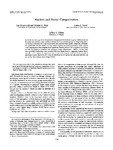Racism and racial categorization.
| dc.contributor.author | Blascovich, J | |
| dc.contributor.author | Wyer, Natalie | |
| dc.contributor.author | Swart, LA | |
| dc.contributor.author | Kibler, JL | |
| dc.date.accessioned | 2014-04-03T12:02:49Z | |
| dc.date.accessioned | 2014-04-03T12:02:56Z | |
| dc.date.available | 2014-04-03T12:02:49Z | |
| dc.date.available | 2014-04-03T12:02:56Z | |
| dc.date.issued | 1997 | |
| dc.identifier.issn | 0022-3514 | |
| dc.identifier.issn | 1939-1315 | |
| dc.identifier.uri | http://hdl.handle.net/10026.1/2970 | |
| dc.description.abstract |
Social identity theory predicts that perceivers strongly identified with an in-group will maximize the distinction and maintain a clear boundary between their own and other groups by categorizing others' membership accurately. Two experiments tested the prediction that racially prejudiced individuals, who presumably identify highly with their racial in-group, are more motivated to make accurate racial categorizations than nonprejudiced individuals. Results indicated that prejudiced participants not only took longer to categorize race-ambiguous targets (Experiments 1 and 2), but also made more nonverbal vocalizations when presented with them (Experiment 1), suggesting response hesitation. The results support the hypothesis that, compared to nonprejudiced individuals, prejudiced individuals concern themselves with accurate identification of in-group and out-group members and use caution when making racial categorizations. | |
| dc.format.extent | 1364-1372 | |
| dc.language | en | |
| dc.language.iso | en | |
| dc.publisher | American Psychological Association | |
| dc.relation.replaces | http://hdl.handle.net/10026.1/2969 | |
| dc.relation.replaces | 10026.1/2969 | |
| dc.title | Racism and racial categorization. | |
| dc.type | journal-article | |
| dc.type | Journal Article | |
| plymouth.author-url | https://www.webofscience.com/api/gateway?GWVersion=2&SrcApp=PARTNER_APP&SrcAuth=LinksAMR&KeyUT=WOS:A1997XB13900009&DestLinkType=FullRecord&DestApp=ALL_WOS&UsrCustomerID=11bb513d99f797142bcfeffcc58ea008 | |
| plymouth.issue | 6 | |
| plymouth.volume | 72 | |
| plymouth.publication-status | Published online | |
| plymouth.journal | Journal of Personality and Social Psychology | |
| dc.identifier.doi | 10.1037/0022-3514.72.6.1364 | |
| plymouth.organisational-group | /Plymouth | |
| plymouth.organisational-group | /Plymouth/Research Groups | |
| plymouth.organisational-group | /Plymouth/Research Groups/Centre for Brain, Cognition and Behaviour (CBCB) | |
| plymouth.organisational-group | /Plymouth/Research Groups/Centre for Brain, Cognition and Behaviour (CBCB)/Cognition | |
| dcterms.dateAccepted | 1997-01-01 | |
| dc.identifier.eissn | 1939-1315 | |
| dc.rights.embargoperiod | Not known | |
| rioxxterms.versionofrecord | 10.1037/0022-3514.72.6.1364 | |
| rioxxterms.licenseref.uri | http://www.rioxx.net/licenses/all-rights-reserved | |
| rioxxterms.licenseref.startdate | 1997 | |
| rioxxterms.type | Journal Article/Review |


